Psychology
Kate Smith, the flag-raising rat

Kate Smith was a rat trained to raise a small American flag. It was trained by Kelly Buckwalter of Santa Barbara High School as "an experiment in operant conditioning" for her chemistry and psychology classes.
Do kids still get to do experiments like this in high school? Somehow I doubt it. Source: The Tuscaloosa News - May 22, 1976.
Posted By: Alex - Sat May 24, 2014 -
Comments (4)
Category: Animals, Science, Experiments, Psychology, 1970s
Sick Sick Sidney
That is one mentally unstable pachyderm.
Posted By: Paul - Fri Nov 15, 2013 -
Comments (5)
Category: Animals, Anthropomorphism, Psychology, Wimps, Milquetoasts and Cowards, 1950s
Saving Money for the Weak of Willpower
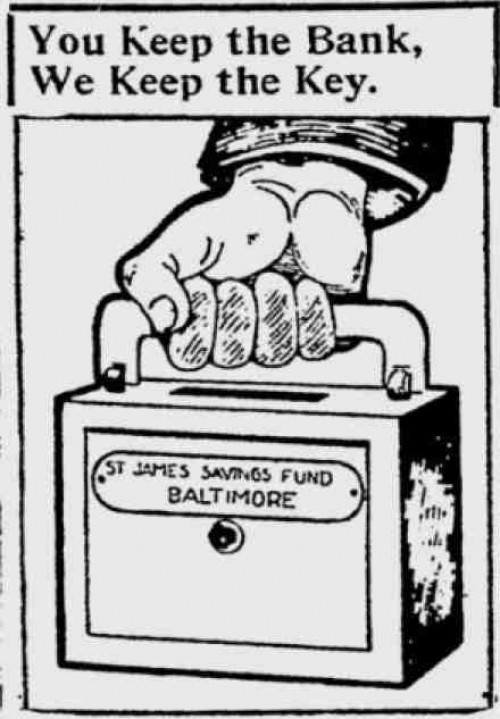
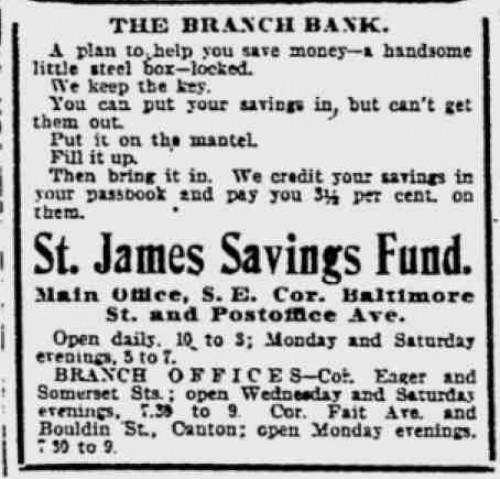
I like this idea a lot. Why doesn't any bank offer such a plan today?

Original ads here (scroll down).
Posted By: Paul - Sat Oct 19, 2013 -
Comments (8)
Category: Money, Psychology, 1900s
Let Mr. Mouse’s Nightmare Help You!
Psychotherapy via mouse torture. Milwaukee Sentinel - Nov 16, 1941.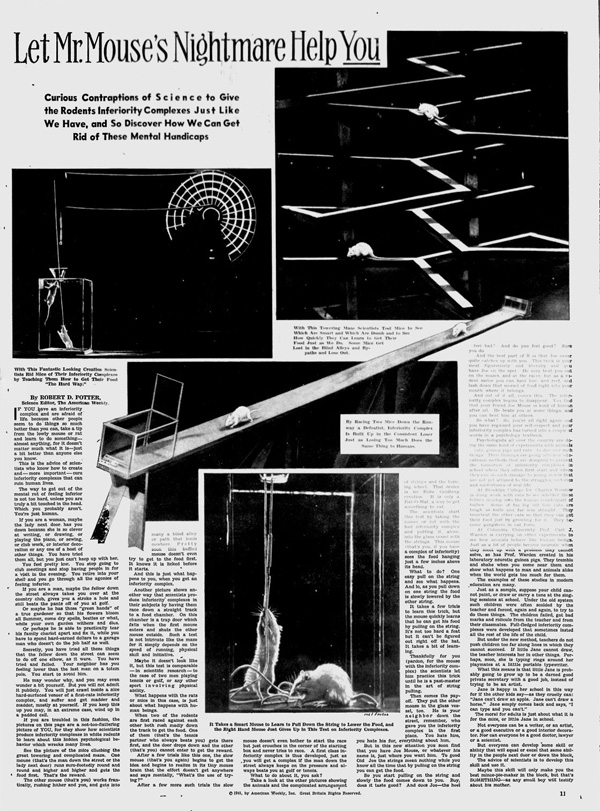
Posted By: Alex - Wed May 29, 2013 -
Comments (7)
Category: Science, Psychology, 1940s
Personalized Alarm Clock
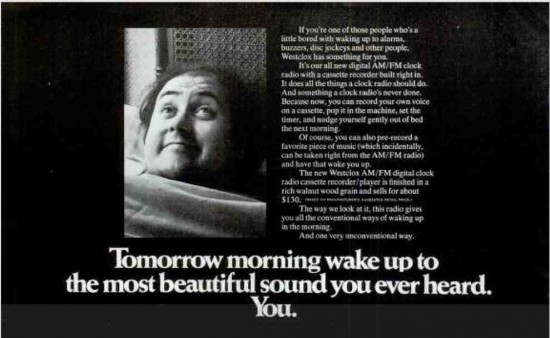
[Click to enlarge for readability]
Upon a moment's reflection, the creepiness of this product becomes apparent, explaining why it never caught on. The notion of one's own voice pleasantly or angrily cajoling the sleeper to awake is straight out of some Philip K. Dick dystopia, in which the hero's brain has been split into two separate personalities. "Wake up, Paul, wake up! Today is the day you must assassinate the ambassador from Rigel Nine!"
Original ad here.
Posted By: Paul - Mon Aug 20, 2012 -
Comments (3)
Category: Domestic, Appliances, Psychology, 1970s
Paris Syndrome
On occasion, Japanese citizens who travel to Paris suffer episodes of extreme depression. The depression can be so severe that it leads to hallucinations and psychosis. The Japanese psychiatrist Hiroaki Ota named this condition "Paris Syndrome." He speculated that it's caused by the difference between the idealized view of Paris that the travelers held and the reality that confronted them.Recently, filmmaker John Menick created a short documentary about this syndrome. He describes it as:
Posted By: Alex - Mon Aug 13, 2012 -
Comments (6)
Category: Travel, Psychology, Documentaries
Voters with amnesia

A study recently published in the American Journal of Political Science found that patients suffering from profound amnesia can still make pretty good voting decisions. That is, even though the patients couldn't remember who the candidates were, or what their positions on issues were, they still somehow picked out the ones whose political views were similar to their own. From the abstract:
I'm not sure whether these results have any relevance to the American electorate. After all, the amnesic patients once knew the candidates' positions, but forgot them. But what about voters who don't know the positions and issues to begin with?
More info — Voting without Remembering: Insights from Patients with Amnesia
Posted By: Alex - Sun Jul 29, 2012 -
Comments (5)
Category: Politics, Psychology
More Blacky Pictures Test Pix
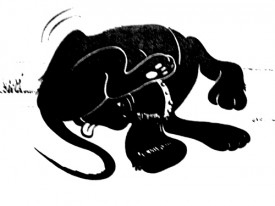
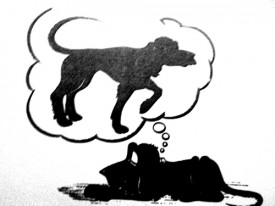

A little more ingenious searching allowed me to find three additional Blacky images.
Posted By: Paul - Fri Jun 08, 2012 -
Comments (5)
Category: Sexuality, Psychology, Children, Dogs, 1950s
The Blacky Pictures Test
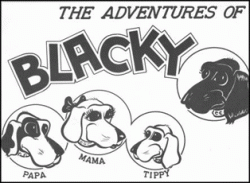
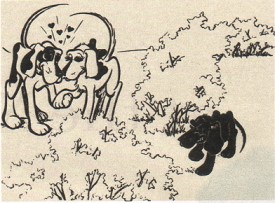
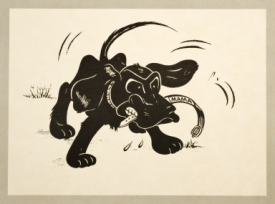
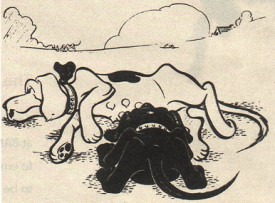
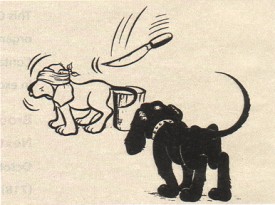
What kind of kids' book is this? A Freudian one, to elicit psychosexual reactions from unsuspecting youngsters. Kids would be asked to interpret these loaded pictures, telling stories that revealed their supposed neuroses. Poor Oedipal Blacky, chewing up "Mama's" collar!
The Blacky Pictures were developed in 1950. They have been described as ‘a technique for the exploration of personality dynamics’ in children. They were developed by G. S. Blum in 1949. Each of the 12 cards making up the test feature a dog named ‘Blacky’. Each cartoon represents a different stage of psychosexual development (the way sexual behaviour develops, according to psychoanalysts). The test also looks at family relationships.
These five images are the only ones I have been able to find on the web, out of the 12 originals.
Posted By: Paul - Fri Jun 08, 2012 -
Comments (8)
Category: Sexuality, Psychology, Children, Dogs, 1950s
Autonomous Sensory Meridian Response, or Braingasms
The Autonomous Sensory Meridian Response (ASMR) Research & Support site defines the phenomenon as, "a physical sensation characterized by a pleasurable tingling that typically begins in the head and scalp, and often moves down the spine and through the limbs." Various stimuli can trigger the sensation -- certain kinds of sights, sounds, and situations. It's sometimes referred to as a "braingasm".I'm not sure whether ASMR is considered to be a scientifically verified phenomenon. Nevertheless, there's a sizable community of people who actively seek the sensation, and they post videos on youtube designed to trigger it. That's why, if you wade deep enough into the depths of youtube, you'll eventually come across a whole slew of odd ASMR-trigger videos, such as this one of the sounds of gift wrapping
I believe that the whisper videos I posted about yesterday are related to this ASMR phenomenon -- because whispering can be an ASMR trigger. That is, most people simply find it annoying to have to strain to hear someone whispering, but there are a few who are getting a tingly, braingasm feeling from it.
Posted By: Alex - Thu Apr 19, 2012 -
Comments (16)
Category: Emotions, Subcultures, Psychology, Brain

| Who We Are |
|---|
| Alex Boese Alex is the creator and curator of the Museum of Hoaxes. He's also the author of various weird, non-fiction, science-themed books such as Elephants on Acid and Psychedelic Apes. Paul Di Filippo Paul has been paid to put weird ideas into fictional form for over thirty years, in his career as a noted science fiction writer. He has recently begun blogging on many curious topics with three fellow writers at The Inferior 4+1. Contact Us |




